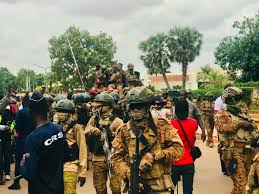
Three years after seizing power in a military coup, Captain Ibrahim Traoré faces an escalating jihadist threat that has left Burkina Faso as the most terror-affected country in the world.
Despite the mobilisation of the Volunteers for the Defence of the Homeland (VDP) and increased military resources, attacks continue unabated, highlighting the profound challenges confronting the transitional government.
On September 30, 2022, Traoré overthrew Lieutenant Colonel Paul-Henri Damiba, who had himself taken power months earlier. Upon assuming office, Traoré promised to restore security within three months, citing the army’s determination and the commitment of the VDP. Yet, three years later, the promise appears overly optimistic.
According to the NGO Acled, conflict-related deaths rose from 6,500 in 2021 to nearly 16,000 in 2024, underlining the intensity and persistence of jihadist violence.
In interviews with local media, Traoré attributed the ongoing insecurity to “maneuvers by foreign forces” and “chronic under-equipment” that hampered his troops’ effectiveness. “We would have liked to have been allowed to work and move forward quickly,” he said, suggesting that external factors slowed Burkina Faso’s counterterrorism efforts.
On the ground, however, the situation remains grim. Armed groups continue to occupy large swathes of territory, isolate towns, ambush convoys, and perpetrate abuses against civilians, despite the government’s reinforcement of personnel and equipment.
The security crisis is compounded by mounting political tension. Trade unions, political parties, and independent media criticize growing repression, arguing that counterterrorism measures have curtailed civil liberties.
Didier Ouedraogo, president of the Burkinabe Movement for Human and Peoples’ Rights (MBDHP), said, “The fight against terrorism cannot justify silencing all dissenting voices.” The army has dismissed these criticisms as “rumors” intended to “undermine national cohesion,” reflecting the leadership’s sensitivity to public discontent.
Traoré retains support among a segment of Burkina Faso’s youth, who view him as a pro-people, anti-imperialist leader. Yet, the stark reality remains: despite sacrifices, strategic rhetoric, and military reinforcements, the war on terror is far from won, leaving the country grappling with insecurity, political tension, and deep societal challenges.



